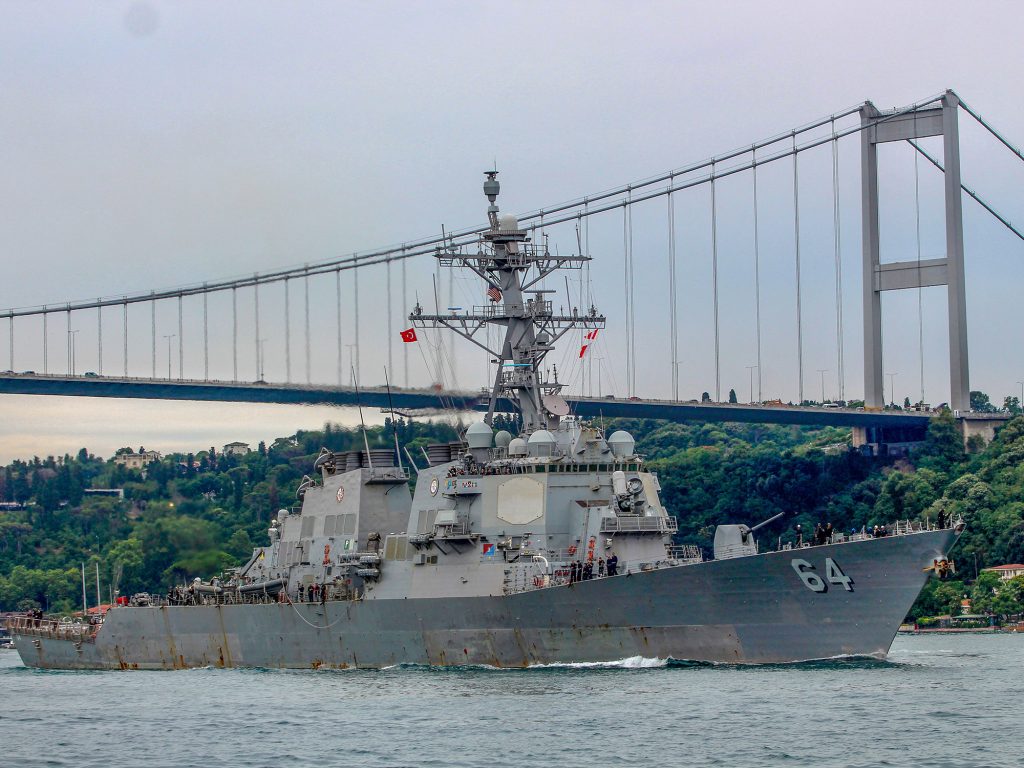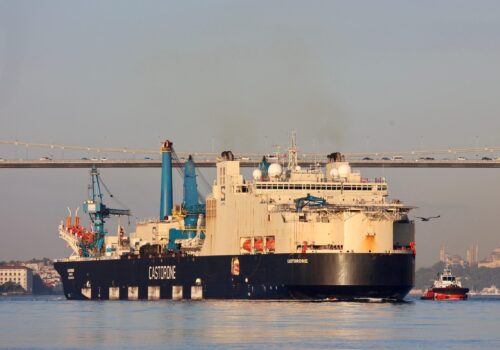The US public got one of its first glimpses of the Biden administration’s strategy on Black Sea security in the form of Assistant Secretary of State for European and Eurasian Affairs James O’Brien’s October testimony before the Senate Foreign Relations Committee.
The testimony follows after US senators Jeanne Shaheen (D-NH) and Mitt Romney (R-UT) introduced the Black Sea Security Act, which called upon the National Security Council, Department of State, Department of Defense, and other agencies to produce an interagency Black Sea security and development strategy. Shortly after, congressmen Mike Turner (R-OH) and William Keating (D-MA) introduced the House companion of the bill. Shaheen later promised to “continue to push” the Biden administration to develop the strategy.
Speaking in front of the Senate Foreign Relations Committee, O’Brien outlined the strategy’s five pillars: increased bilateral and multilateral engagement; regional security cooperation, buttressed by an enhanced NATO presence; economic cooperation; energy security; and democratic resilience.
For Black Sea watchers concerned with the decades of US indifference or mixed messages toward this critical region, the bipartisan efforts to address the growing instability under Russian aggression are welcome. For too long, rhetoric about the Black Sea region’s strategic importance to European security and US national interests has not resulted in much action. Russian President Vladimir Putin’s full-scale invasion of Ukraine in 2022 raised the stakes and the urgency for Western leaders to act.
While the efforts behind the Biden administration’s strategy may be a good start, a loosely defined strategy does not necessarily mean a positive impact on the ground—much still needs to be done. Appropriations will need approval from Congress, some members of which are growing skeptical and showing fatigue with the war in Ukraine—and their attention is split with deteriorating conditions in the Middle East and China’s rising threats in the South China Sea. The United States is on the cusp of an election year, during which foreign policy discussions will likely be distorted or shelved. In other words, don’t expect to see anything substantive on the Black Sea security strategy until 2025.
Perhaps more challenging, it will also be necessary to get buy-in from the Black Sea’s regional players, a notoriously diverse and contentious group of countries. While temporarily united by a fear of Russia, this unity may not last, requiring a long-term, structured, and comprehensive approach—with Washington as the honest broker, placing even more importance on a US-derived regional strategy.
Buy-in—particularly from large regional players such as Ukraine, Romania, and Turkey—cannot be ignored. Turkey controls the Straits in and out of the Black Sea and thus maintains considerable military and political sway beyond its borders. Any broad regional security strategy without Ankara’s tacit acceptance will be virtually impossible to execute.
The Black Sea’s NATO member states—Bulgaria, Romania, and Turkey—will certainly benefit from the increased US attention on Black Sea region security. However, these countries already have NATO Article 5 protection, and Russia has assiduously refrained from any overt military actions against a NATO member. Ukraine, while not a NATO member, has received considerable support from Washington and has proven it can go toe-to-toe with Russia in the battlespace. Moreover, as it holds Russia back from accessing other areas of Europe, Kyiv will continue to receive Western support.
The Black Sea region’s smaller, non-NATO states could be left behind. The United States should lend particular focus to them. Moldova is under tremendous pressure from the Kremlin, while Georgia (already invaded and occupied by Russia) is also vulnerable. Armenia is now reevaluating its close ties with Russia and is considering a stronger relationship with the West. Any attempt by Yerevan to leave Moscow’s orbit will trigger a harsh response from the Kremlin. The specific needs of Azerbaijan—a key source of European oil and gas and a major competitor to Russia—must also be considered within a Black Sea strategy.
Additionally, it will be important to protect freedom of navigation in the Black Sea, notably amid the presence of sea mines and UAV attacks on shipping. While the Montreux Convention may limit direct military support, continual US leadership is vital to coordinate greater cooperation between the littoral states, as well as US funding and training to regional military establishments.
Arguably, it is the economic and energy security pillars of the strategy that hold the most promise. This strategy must include a strong private sector component; in implementing the strategy, Washington must offer support and incentives to US companies to venture into the region. Moreover, the countries in the region must demonstrate good governance and offer a level playing field for this outside investment to materialize.
In his testimony, O’Brien detailed Project Phoenix, a partnership between Romania and the United States designed to increase the region’s energy security. O’Brien said the Development Finance Corporation and Export-Import Bank of the United States signed letters of interest totaling four billion dollars “to deploy a small modular reactor project in Romania.” At the same time, littoral states are working to boost their own energy security, for example with offshore energy projects underway in Bulgarian, Romanian, and Turkish waters. Yet Russia is determined to keep its energy dominance, and with a penchant for malign influence operations, will likely attempt to scuttle the United States’ efforts to help the Black Sea’s littoral states. The United States and its regional allies must be prepared with an effective strategic communications response if Russia unleashes malign influence operations—including a strategic disinformation campaign—designed to stop Project Phoenix. Such campaigns may not be unprecedented, as some European officials suspect (although without clear proof) that Russia helped finance protests against Chevron projects in Lithuania and Romania in the 2010s.
Any strategy that does not follow with a long-term focus, adequate funding, and a communication campaign highlighting that the region is open for business will ultimately fail. The United States’ attempt at getting serious about a Black Sea security strategy will require continued persistence, patience, and deep pockets to succeed. Ultimately, it is worth the price.
Arnold C. Dupuy is a nonresident senior fellow at the Atlantic Council IN TURKEY, a faculty member of the US Naval Postgraduate School, and chair of the NATO Science and Technology Organization’s SAS-183, “Energy Security Capabilities, Resilience and Interoperability.”
Further reading
Tue, Nov 7, 2023
Ukraine reports fresh success in the Battle of the Black Sea
UkraineAlert By Peter Dickinson
Ukraine's success in the Battle of the Black Sea should convince the country's Western partners to finally abandon their cautious approach and provide the Ukrainian military with the weapons they need to defeat Russia, writes Peter Dickinson.
Wed, Jul 26, 2023
A new Black Sea natural gas project could be a game changer for the region—and a challenge for Putin
TURKEYSource By Arnold C. Dupuy
Romania's efforts to develop Black Sea gas can weaken Moscow's influence. Here's how.
Fri, May 5, 2023
To secure the Black Sea, the West must help Moldova stand up to Russian aggression
TURKEYSource By Arnold C. Dupuy
Moldova is working on orienting itself more closely with the West, but it needs support to fend off Russian pressure and attempts to gain influence.
Image: The US Navy destroyer USS Carney (DDG 64) sets sail in the Bosphorus in Istanbul, Turkey on July 14, 2019. Photo via REUTERS/Yoruk Isik.



